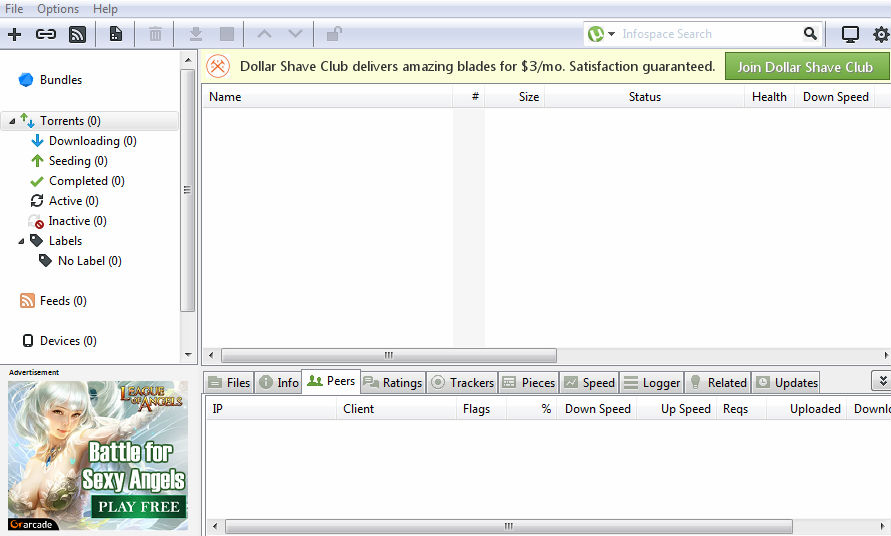TorrentFreak Email Update |
- Young Swedes Who Have Never File-Shared Up By 40%
- uTorrent Makes Advertisement Unremovable in Latest Release
- MP3, DVD and CD Copying is Now Legal in The UK (For Some)
| Young Swedes Who Have Never File-Shared Up By 40% Posted: 03 Jun 2014 02:49 AM PDT
The Cybernorms research group at Lund University in Sweden has been in the news several times during the past few years as a result of its work with The Pirate Bay. On more than one occasion the infamous torrent site as renamed itself to The Research Bay in order for researchers to collect information on the values, norms and conceptions of the file-sharing community. Cybernorms have now revealed more of their findings which suggest that after years of escalation, online sharing by those in the 15-24 year-old bracket could be in decline. Survey responses from around 4,000 individuals suggest that the number of active file-sharers has dropped in the past two years. Those who share files daily or almost daily has decreased from 32.8 percent in 2012 to 29 percent in 2014. “It is a small but significant decrease,” Måns Svensson, head of Cybernorms at Lund University told SVT. Perhaps the most interesting aspect of the decrease is the mechanism through which it was encouraged. Historically, entertainment industry scare tactics have been employed to try to reduce unauthorized sharing, but the researchers believe something much more positive is responsible. “What is interesting is that this is the first time we have been able to see that file-sharing has gone down but without that being associated with a conviction, such as the Pirate Bay ruling,” Svensson says. “If you listen to what young people themselves are saying, it is new and better legal services that have caused the decrease in file-sharing, rather than respect for the law. There has been a trend where alternative legal solutions such as Spotify and Netflix are changing consumption patterns among young people.” Also of interest is the apparent effect on up-and-coming youngsters who might otherwise have begun file-sharing themselves. The researchers found that between 2009 and 2013 the percentage of young people who had never shared files increased from 21.6 percent to 30.2 percent, a boost of well over a third. Interestingly, in that same four-year period, the percentage of young people who said they believe that people should not share files because it is illegal dropped from 24 percent to 16.9 percent. So, even while young people are sharing files less often, their acceptance of the standards presented by the law appears to be dropping too. In this case it does indeed appear that the carrot is mightier than the stick. Source: TorrentFreak, for the latest info on copyright, file-sharing and anonymous VPN services. |
| uTorrent Makes Advertisement Unremovable in Latest Release Posted: 02 Jun 2014 11:28 AM PDT
One of the biggest backlashes in recent history happened two years ago when BitTorrent Inc. announced its plan to make uTorrent ad-supported. This announcement led to a small user revolt. The people complaining were mostly annoyed that there was be no option to disable the ads. Luckily for them, BitTorrent Inc. listened to the feedback and quickly decided that users would indeed get a chance to opt-out. At the time BitTorrent Inc. CEO Eric Klinker said that the backlash made it clear that users should be given the choice. "We've long contemplated an opt-out mechanism for the new offers and advertisements we will be experimenting with. Given all that's been said here, we've decided to release the initial version with an opt-out mechanism, and we will provide them with ways to do so," said BitTorrent CEO Eric Klinker. From that moment uTorrent’s ads became optional, but turned on by default. Still, the company managed to generate billions of ad impressions per month. Five billion to be precise, according to information released last year. The optional advertisements were a situation most users could live with, but right before the weekend uTorrent pushed through an unexpected and unannounced change. The latest stable release version 3.4.2, no longer gives users the opportunity to opt out from the banner ad in the lower left corner.  As can be seen below, the option “show plus information” has been removed from the context menu. In addition the advanced setting “gui.show_plus_upsell,” which had the same functionality, has disappeared as well.  At this point it’s unclear why BitTorrent Inc. removed the opt-out. The change is not documented in the release notes, but several users were quick to pick it up and began asking questions. The uTorrent development team hasn’t responded to the comments yet. Some users are nonetheless quick to draw their conclusions, much like two years ago. “Just like the coming of the video killing the radio star, ads will kill uTorrent’s popularity,” one user comments in the forums. While there is no longer an option to hide the uTorrent Plus house ad, people can prevent other ads from showing up there by going into the advanced settings. Setting offers.left_rail_offer_enabled to false should restrict the ads to the uTorrent Plus upsell. There is no denying that the advertisements, in addition to the toolbars and other software that’s bundled with uTorrent, generate the majority of the revenue for BitTorrent Inc. Perhaps this latest change is an attempt to increase the revenue coming from the banner ads, which eventually goes to paying the company’s bills. Whether this will be a wise decision in the long run remains to be seen. Source: TorrentFreak, for the latest info on copyright, file-sharing and anonymous VPN services. |
| MP3, DVD and CD Copying is Now Legal in The UK (For Some) Posted: 02 Jun 2014 07:01 AM PDT
Starting today this is no longer the case for the disabled, thanks to a revision of copyright law that just went into effect. Disabled citizens can now copy and publish copyrighted material if there’s no commercial alternative available. “Disabled people and disability groups can now make accessible copies of copyright material (eg music, film, books) when no commercial alternative exists,” the Government announced today. Previously the Government also said that all private copying for personal use would be legal starting in June, but this has apparently been delayed pending Parliament approval. However, following a thorough inspection of local copyright legislation the UK Government has already committed to change current laws in favor of consumers. "Copyright law is being changed to allow you to make personal copies of media you have bought, for private purposes such as format shifting or backup," the UK's Intellectual Property Office (IPO) previously announced. "The changes will mean that you will be able to copy a book or film you have purchased for one device onto another without infringing copyright." In other words, people will be free to rip CDs and DVDs or backup their MP3s to an online storage provider, without risking legal trouble. The Government emphasizes, however, that it is still not allowed to share these personal copies with the rest of the world. “You will be permitted to make personal copies to any device that you own, or a personal online storage medium, such as a private cloud. However, it will be illegal to give other people access to the copies you have made,” the IPO explains. It is no secret that several entertainment industry groups are wary of the new copying regulation. However, before implementing the changes the Government carefully researched the economic impact for copyright holders, concluding it to be minimal. On the other end of the spectrum, it’s expected that the technology sector will greatly benefit from the newly gained freedom. The revised copying rules are expected to generate an additional £31 million in revenue per year. This money will come from consumers who use services and products to assist their copying needs. "This measure will benefit technology firms by removing barriers and costs and improving entry to technology markets which rely on consumers being able to make private copies," the IPO predicts. Besides new private copying rights, the upcoming amendments will also broaden people's fair use rights. For example, people no longer have to ask permission to quote from or parody the work of others, such as a news report or a book, as long as it's "fair dealing" and the source is recognized. A complete overview of the changes, and how they apply to the public, are summarized in a handy guide published by the UK Intellectual Property Office. Update: This article initially stated that the general private copying restrictions were also lifted, as announced previously and still listed in the consumer guide. However, these still have to be approved by Parliament. The article has been updated accordingly. TorrentFreak asked IPO to clarify the confusion and we will post the response here when it comes in. Source: TorrentFreak, for the latest info on copyright, file-sharing and anonymous VPN services. |
| You are subscribed to email updates from TorrentFreak To stop receiving these emails, you may unsubscribe now. | Email delivery powered by Google |
| Google Inc., 20 West Kinzie, Chicago IL USA 60610 | |

 With roughly 150 million monthly users uTorrent has a massive user base. This means that when drastic changes are implemented, they are bound to disappoint quite a few people.
With roughly 150 million monthly users uTorrent has a massive user base. This means that when drastic changes are implemented, they are bound to disappoint quite a few people. 